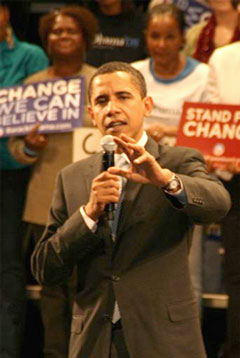
From the introduction:
From the moment Barack Obama gave his speech on the 18th of March, 2008, commentators recognized that a rare event had occurred in American political history. Those who thought in political terms believed that this was one of the great Presidential campaign speeches, on the level of the best ever given.
Obama‘s speech also was judged in the tradition of American statements of equality that begins with the Declaration of Independence and includes the Gettysburg Address and the I Have a Dream speech of Martin Luther King in the summer of 1963.
It was understood from the time he gave the speech that Obama had written it himself in the two days before he gave it, and that he had shown it only to a few members of his campaign staff. So the assessments of its importance as a campaign speech and as an expression of race relations were based upon the work of the speaker, not on that of a group of speech writers.
The starting point for this book is a simple question: does this speech have real merit? Does Obama have anything substantial to say, or are his words merely empty sentiments? Does he ask anything of the American people, or does he offer them only congratulatory platitudes? How does he express himself? Does he use special vocabulary or employ grammatical and poetic devices? Does he operate from any underlying structures that shape his thinking about how Americans might meet the issues he raises?
The speech proves to be worthy of close study. It is a remarkable expression that shows exceptional ability, the sort of ability that Thomas Jefferson or Abraham Lincoln demonstrated.
Like Jefferson and Lincoln, Obama has shown the capacity to shape the perception of reality with his words. Perhaps even more than Jefferson and Lincoln, Obama has altered the reality of his time with his oratory. Americans owe to Jefferson the understanding of the central belief that binds us together as Americans and Lincoln provided eloquent expression of how that belief is embodied in government. Obama has given expression to a new reality in race relations in the United States, a new reality that he himself seems on the threshold of creating.
In many ways Obama’s speech is remarkable for a modern American politician. Confronted by a threat to his candidacy, he did not blame or attack his opponents; he mentioned them only in passing. He did not disown the man whose words were the source of the threat. He did not try to use voters’ emotions as motivation to secure their support. He did not play on the divisions between groups to win votes. He did not write his speech for applause lines, and he did not end with a rousing peroration.
The great campaign speeches and statements about equality have a common characteristic: their occasion may be fleeting, but they transcend the moment and become part of the national conversation for years or decades to come. In particular, the discussions of equality have had an enduring resonance in American history because the question is central to our definition of ourselves as Americans.
 Read the full introduction
Read the full introduction
 Read the table of contents
Read the table of contents
 Read Chapter 14: Conclusion
Read Chapter 14: Conclusion
The above links are downloadable .pdf documents - you may need to install Adobe Reader
Buy this book online now with our secure payments server.